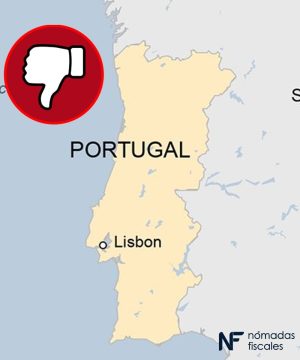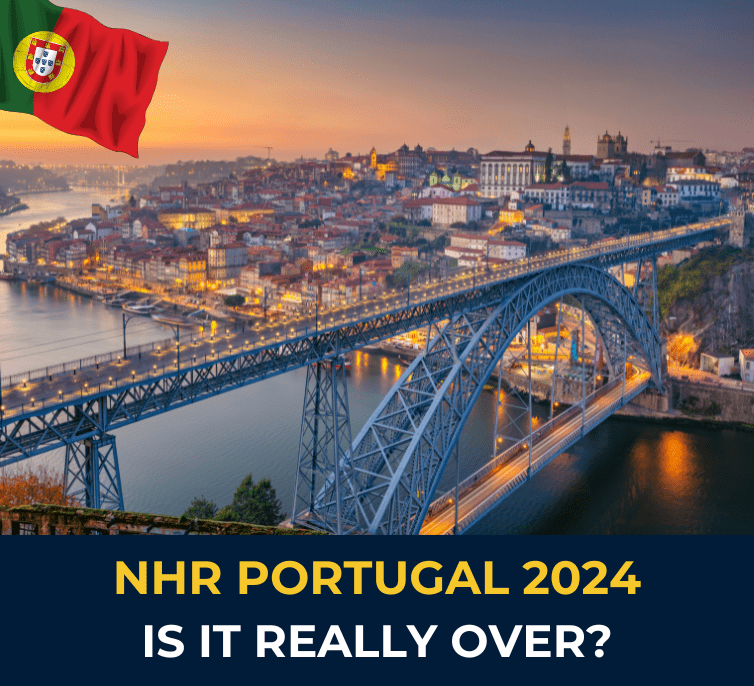Update 2025: New NHR 2.0 (IFICI) Tax Regime
Currently, the new NHR 2.0 (IFICI) tax regime in Portugal is fully defined, with significant changes in taxes, requirements, and benefits.
This article remains published as a historical reference to the former NHR regime
Portugal, after Andorra, is the most chosen tax residency option for Spanish tax residents.
In fact, since 2021, the number of people inquiring about relocating to Portugal has increased considerably, as the Non-Habitual Resident (NHR) regime began to gain significant fame among the tax avoidance community on social media.
In addition to the NHR, Portugal offered favorable conditions in the realm of cryptocurrencies, residence permits, tax avoidance through LLCs, etc.
For all these reasons, the country has attracted the attention of Tax Nomads worldwide…
Until now!
Portugal has introduced numerous modifications for 2024, completely changing the landscape and attractiveness of the country.
Portugal Tax Residency Benefits
The main incentives that Portugal offered as a tax residency were:
- Allows for tax residency by simply maintaining a permanent residence in the country
- Tax exemption (0%) on FOREIGN income (e.g., property, interest, and dividends) through the NHR regime
- Flat tax rate of 20% on employment income and self-employment income through the NHR regime
- 0% tax on cryptocurrencies
- 0% wealth tax
- 0% inheritance and gift tax
Certainly, these tax benefits look very, very good.
But they started to come to an end in 2023!

Portugal in 2024 and the Future of the NHR
The first of the changes occurred last year with the new cryptocurrency regulation in Portugal.
This regulation ended the permanent 0% tax on cryptocurrencies and established that ONLY crypto gains derived from investments held for more than 1 year would be treated at 0%.
That is, any buy-sell transactions in less than 365 days of holding, trading, etc., would be taxed at the dreadful 28% Portuguese capital gains tax.
Now, in 2024, the government has approved THE END of the NHR regime as we knew it.
From January 1, 2024, only those who already had effective residence in Portugal before that date can maintain the NHR regime (until it expires).
From that date, a “new NHR” will begin, for which details are still pending, but we already know that:
- It will maintain the same or very similar tax advantages
- But it will be very limited. Only available to scientific, technological, or R&D professionals working for “startups”
This has completely destroyed the structures and tax plans that were based on managing or creating offshore companies (such as LLCs) to extract profits at 0% and relocating employees and self-employed professionals of all kinds who sought to pay a flat 20% on their income.
In our experience, this new limitation by professional activity will drastically reduce (+90%) the number of people who can qualify.
Under this scenario, Portugal becomes one of the worst tax residences (almost on par with Spain).
Income taxes, corporate taxes, social contributions, and capital gains taxes make Portugal a real tax hell for most.
Now that we know all the updates, we have to ask ourselves:
What does Portugal offer starting in 2024?
From a tax perspective, the only advantages that remain are:
- NHR only if you meet very specific criteria
- Absence of inheritance and gift tax
- Absence of wealth tax
- 0% tax on crypto investments held for more than 1 year
- Registration of low-tax companies in the Madeira Special Zone (5% taxes)
These are, therefore, isolated benefits that will only be useful to very specific profiles and cases.
Of course, at Tax Nomads, we will continue working with Portugal (albeit less generally) to reduce the tax burden wherever possible.
Golden Visa, Passport, and Digital Nomad Visa
Portugal has not only gained fame as a tax residency.
It is also a recognized destination among those outside the EU for its Golden Visa, ease of obtaining citizenship, and its Digital Nomad visa.
As a member of the European Union, many wish to reside permanently in it, eventually
It is possible to achieve Portuguese citizenship by naturalization in just 6 years, but to do so, you first need to obtain a residence permit in the country.
This is where the concept of the Golden Visa becomes relevant, the residency-by-investment program that allows non-EU citizens to obtain a residence permit in Portugal.
However, this program has also been affected by changes, currently NOT allowing investment in real estate, only in job creation in the country, investment funds in the country, R&D… for a minimum of €500,000.
As you can see, this program is not for everyone.
But if you are a Digital Nomad and wish to experience living in a European country for a year, there is the option of the Portuguese Digital Nomad visa.
Alternatives to Portugal Non Habitual Residency
Although the limitation on the NHR is a tough blow for many Tax Nomads who saw Portugal as ‘the only option,’ it by no means spells the end of Tax Nomadism.
There are many other tax residencies better than Portugal, as well as other regimes under ‘Non-Dom’ like the NHR, offering the same or even better conditions.
Other examples of non-dom systems can be found in the United Kingdom, Ireland, Malta, or Cyprus.
In fact, Cyprus offers 7 more years than the Portuguese NHR (17 years) with much fewer requirements.
Any person with a residence permit can obtain non-dom status and enjoy all its tax benefits.
In conclusion, taxation is a constantly evolving field. Therefore, as Tax Nomads, it’s important for us to stay informed to maintain control over our money 😉
Are you interested in obtaining residency or setting up a company in Portugal?
Or would you prefer a complete analysis of your situation to discover the best option for you?
In either case, we can help!
Simply request your FREE INITIAL CONSULTATION BY CLICKING HERE, or contact us directly via WhatsApp or through the form below.
Contact us
- Income Tax (IRPF): Progressive scale up to 48%
- Capital Gains Tax: Flat rate of 28%
- Tax on Dividends, Interests, and Royalties: Flat rate of 28%
- Corporate Tax: 21%
- Social Security Contributions: Up to 34% with no cap
- Inheritance and Gift Tax: 0%
- Wealth Tax: 0%
- Long-term Cryptocurrency Investment Tax: 0%
Portugal’s NHR (Non-Habitual Resident) regime is an attractive offer for foreign citizens seeking to reduce their tax burden. The regime provides reduced tax rates on income generated within the country and exemptions on foreign income for foreign residents for a period of ten years.
In 2024, the NHR regime has been modified, and only specific profiles of professionals will be eligible for it.
Starting in 2024, the requirements for the Portuguese NHR will be as follows:
- Not having been a Portuguese resident during the previous 5 years.
- Having a long-term available residence (owned or rented) in the country.
- Relocating to work in higher education, scientific research, or at startups.
- Working for certified startups.
There are numerous tax residencies that can enhance the benefits of Portugal’s NHR.
For instance, in Europe, there are several non-dom systems that can be useful such as Ireland, Malta, the United Kingdom, and Cyprus.
Starting in 2024, the main advantages of Portugal are:
- No inheritance or gift tax
- No wealth tax
- No taxes on long-term investments in cryptocurrencies
- NHR regime for specific professions
- Citizenship by naturalization in 6 years

